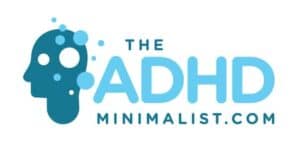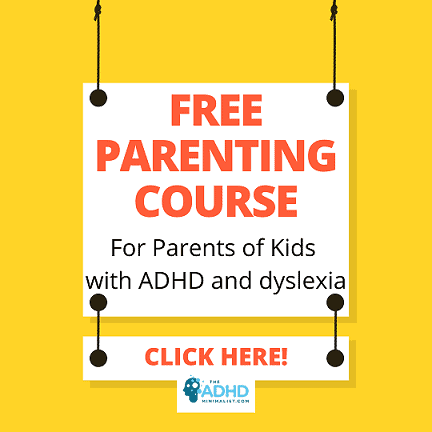
Three years ago my son (who has ADHD) piled all the possessions he didn’t want to keep in our hallway. He was determined to have a clutter-free room!
The pile became so huge that I couldn’t get to our only bathroom!
When I asked him what he was doing, he first yelled at me for putting clothes in his drawers that he already rejected, Then he explained that he felt less anxious and calmer when he wasn’t surrounded by clutter! He was 10 at the time.
I always had a lot of stuff growing up, but my stuff problem got worse after my father started a new job with considerably less pay. I started a new school around the same time, and I felt like my clothes weren’t as nice as my classmates.
I must have subconsciously started hoarding clothes because I never knew when my parents could afford new clothes.
This clutter problem followed me into adulthood and my children always had way more clothes and toys than they needed.
After my son decluttered his room he begged me to declutter the rest of the house!
I reluctantly began decluttering hating every minute of it, but when I finally got our main living spaces under control I realized that the new decluttered environment reduced my anxiety as well!
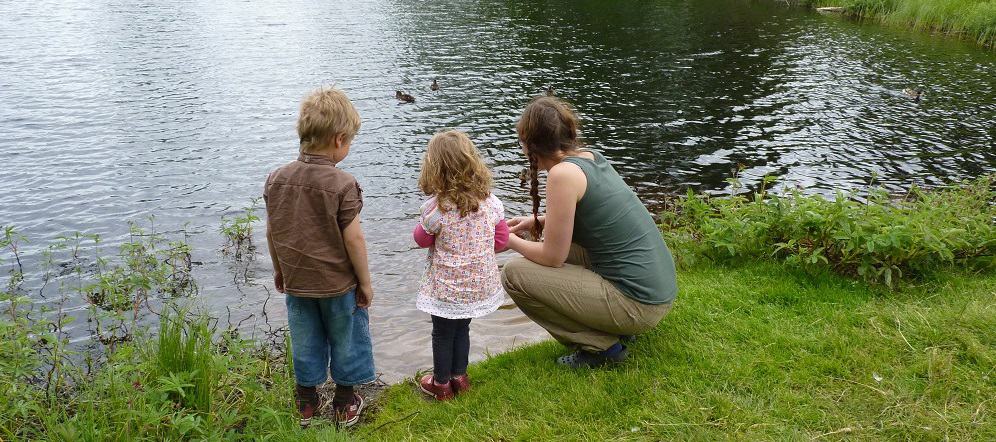
1) Minimalism Reduces Overwhelm and Mental Load
Too many items that your brain needs to register, sort, and file on a daily basis can overload your visual cortex. Often we refer to this as Mental load.
Psychologist Sherri Bourg Carter elaborates on this, “Clutter bombards our minds with excessive stimuli (visual, olfactory, tactile), causing our senses to work overtime on stimuli that aren’t necessary or important,” she explained for Psychology Today.
The concept of Mental Load has become more widespread thanks to a French comics artist Emma.
She illustrates how women often try to manage an excessive number of tasks, appointments, and meetings, as well as managing the entire home, and everything surrounding their children while their husbands have no mental load and wait to be asked to help.
Read the comic here to fully understand the concept
This comic illustrated exactly how I felt several years ago when my youngest was quite small and all three of my children placed extreme demands on my time and attention!
Because my kids have ADHD my mental load far exceeded the overloaded mother who had 3 healthy children!
I had doctors appointments to manage, extra meetings with the school, medicines to remember (My son had adverse reactions to many ADHD meds which made things even worse!), a baby with colic who cried for 3 hours every evening to take care of, an 8-year-old who talked about suicide to keep in earshot, and a husband who worked away from home every other week.
On top of this were the normal doctors and dental appointments, the regular parent-teacher conferences, my children’s sports twice a week, shopping for groceries, helping with homework, doing laundry, and all the other ‘Normal’ Mother tasks!
It didn’t help when my husband came home and asked what I did all day when he saw the messy state of our home! His asking why I couldn’t keep the kitchen clean, or wondering why I refused to pay the bills was usually met with the full force of my frustration!
A side note (I want to point out that my husband works really hard to support our family and I chose to be home part-time. I will admit there are some days I would rather be all work all day! He does help and he does dishes or starts the wash without me asking him to. I do need to ask If I want specific things done, but he is usually happy to help. The management of the home naturally fell to me because I am home part-time.)
When I was feeling extremely anxious and overwhelmed trying to manage everything, I tried to explain how I felt to my husband.
‘’I feel like in my head I am always juggling balls (which are MUST REMEMBER thoughts!!) I am trying to keep so many balls in the air that it is impossible.
Every once in a while I drop one and I disappoint my husband and the kids. I am trying to keep all the balls in the air and hold it all together even though I am barely managing this on good days!
Daily I am thrown curveballs (extra balls others expect me to catch and juggle). It can be doctors, teachers, work, the kids, or you.’’ I told my husband. ‘’It’s these unexpected balls that nearly push me over the edge and cause me to drop all the balls!
I finally realized that I was going to need to give some of my ‘Unexpected Balls’ or my ‘Excessive Mental Load’ to my husband. I started asking him to take responsibility for specific things. At first, it was hard for me to quit reminding him, but it becomes easier to delegate over time!
Recently I asked my husband to take responsibility for booking, going to my son’s parent-teacher conference, and giving me a report. He did a great job and I didn’t remind him a single time! (My son is now in seventh grade.)
Despite the fact that I wanted to have a clean and organized home I could never seem to manage it! I had too many things to manage both physical things in our home and appointments etc.
If you live in a mess with no organizational systems this can cause your brain to work overtime which leads to anxiety, exhaustion, and the inability to handle your mental load.
Decluttering my home considerably lessened my mental load!

2) Less clutter allows you to prioritize what is important!
When I decluttered I could see the reminders I wrote myself and the items I laid out for my children to take to school!
I used to feel completely overwhelmed in the mornings. My children have ADHD and need help to remember basic school items like clothes for gym class, snacks, homework, and medications!
I even have to help them put their coat on and pick up their backpack on the way out the door!
I could remember my kid’s schedule better after we decluttered. I didn’t forget the special items they needed for different school days as often.
My visual cortex was overwhelmed by the mess. This caused me to be forgetful!
Since my kids have ADHD It was hard for them to sort through piles of toys and put things away without my help. If they mixed several categories of toys together like legos, building blocks, and their wooden train set it compounded the complexity of picking up the toys!
In the end, this was my fault. I thought I was helping the kids by giving them many different toys to keep them entertained, but the toy mess was adding to my mental load and stressing me out!
When I addressed this problem we gave away many toys and boxed up some toys to rotate them.
Right now we have 2 boxes in the storage room one Lego box and one Pet Shops box that can be rotated with Barbies which are currently in use. It’s easier for my kids to put toys away when there is less inventory!
(We initially had more toys which we rotated in and out of an area we dubbed ’The playroom’ which was actually not a room just a wider part of a hallway with a fireplace, but we have given some categories away as the kids grew out of them.)
You can read about how we rotate toys and my strategy for decluttering kids’ toys and kids’ clothes in these blog posts Decluttering kids toys and other monsters in their rooms. and What To Do If Your ADHD child Is A Pack Rat! and Help ADHD (ADD) kids clean their rooms and stay organized
Decluttering is about only keeping the important items! When I had too much inventory in our home I would write myself a note and I wouldn’t even notice it the next day! It got lost in the sea of junk!
In all the clutter I didn’t see my handwritten reminders, and I continuously felt that I was forgetting something important and couldn’t figure out what it was, this constantly stressed me out!
I continuously felt anxious about forgetting things!
When you declutter your schedule you automatically see what and who is most important in your life. Once you know this you can prioritize what you believe is most important.
Prioritizing and saying NO to extra events or items is an important skill to learn that will keep you from stretching yourself too thin and having an anxiety attack!

3) After decluttering I automatically felt like a better parent
I quit stressing about many small everyday things and I felt like I did a better job of parenting after I decluttered.
Decluttering was one of the best things I ever did!
I think all parents feel inadequate as parents from time to time.
Some of us feel chronically inadequate as parents. If this is you try having less stuff and activities to manage. This will automatically free up time for you st spend with your kids!
When I decluttered my kids’ clothes (My children helped) I had fewer piles of dirty clothes to wash, and my daughter no longer mixed clean and dirty clothes on her bedroom floor!
This occurred when she couldn’t find specific items that she wanted to wear to school. She would pull everything out of her drawers and throw it on the floor on top of her dirty clothes from the night before!
I found her room in this state several times a week and If I didn’t sort through the pile and put the clean clothes back before she came from school she would be overwhelmed by the mess and dump all the clothes in the dirty laundry basket!
This was extremely frustrating!
When I decluttered toys I was no longer upset with the kids for getting out piles of toys and not putting them away!
My kids have ADHD so I had unrealistic expectations when I asked them to sort through 4 different kinds of toys, all mixed together! When I decluttered there were not as many toys and this was no longer a problem.
I can remember my children’s school activities, packing lists for school, and kids’ medications better after I decluttered! Forgetting important items (or events) always made me feel like a failure as a parent (I probably have ADHD myself)!
Having less to clean gave me more time to help my kids with their homework. They needed LOTS of HELP with their homework.
Even if I helped, homework could provoke tears and my children became extremely frustrated with me for making them do homework. I had to work with the school to find homework that would help them develop their skills at the level they were at.
Just the fact that I was able to help them with homework at all made me feel like a better parent.
When my children were stressed out they flat out refused to do their homework, and wouldn’t even try!
My house is cleaner after decluttering and this helps me feel like a better parent as well! I didn’t want my kids to grow up in a mess!

4) Objects that Make us Feel ‘At Home’ in our Space decrease anxiety!
A study called the ‘’The Dark Side of Home’’ done by Joseph Ferrari who is a professor of psychology working at DePaul University of Chicago, along with Catherine Roster and M.Peter Jurkat from the University of New Mexico’s Anderson School of Management looks at how some attachment to a few possessions is a good thing, but a deep attachment to many different items is unhealthy!
A few nosological items can make us feel more “at home”, but when the items we are attached to become overabundant and clutter takes over our home, the benefits of these special objects is lost!
In the study, Joseph Ferarrie defines clutter as “an overabundance of possessions that collectively create chaotic and disorderly living spaces.”
In other words, a few objects that hold sentimental value or a handful of objects that we highly prize for their aesthetic qualities help us to feel ‘At Home’ when we are at home, this is a good thing. It helps us relax and feel we belong in our space.
When these objects that we perceive to be projections of ourselves multiply and begin cluttering up our home this attachment to things can undermine our mental health.
A cluttered home causes anxiety hinders us from making good decisions, and even causes us to buy even more items!
Decluttering can be a way to celebrate the things that are important to you! Make space for your special things, by getting rid of the clutter around them, so others can actually see and appreciate what’s important to you!

5) I don’t need to keep up with the Jones!
If you ever watched the movie The Joneses (Staring Demi Moore and David Duchovny) it draws the idea of putting up a facade of material wealth for your neighbors to its spets resulting in incredibly sad outcomes for several involved!
When I don’t need a bigger house and a better car to impress others I can be happy with what I have.
This decreases stress and anxiety because I am not pressured to buy things that I can’t afford, and I don’t compare myself with others as often.
I appreciate what I have instead of focusing on what I don’t have!

6) Living with less = fewer financial worries!
If you ever purchased something unnecessary with a credit card and regretted it, then you know how freeing living within your means can be!
Financial stress is something that can keep you awake at night and cause high anxiety levels!
Eliminating financial stress can improve your mental health. Minimalism encourages us to buy what we need, and stop impulse buying things we don’t need!
Use the money you save to pay off debts. This will add to your financial stability and decrease anxiousness about unexpected experiences!
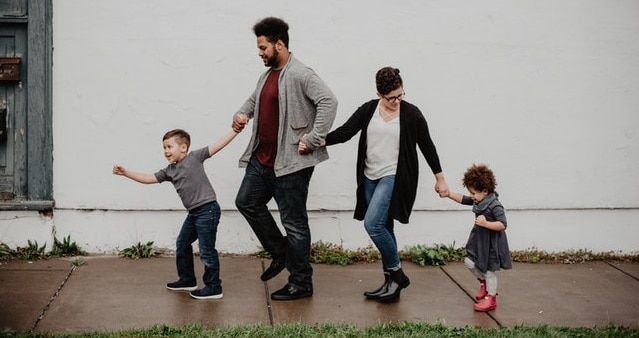
7) My house is automatically cleaner and I don’t need to stress about unexpected visitors!
Having ‘A Mess‘ that needs cleaning up hanging over your head is constant stress nagging at the back of your mind!
I know I have been extremely embarrassed when unexpected visitors popped their heads in our door!
I almost always invited them in despite the mess, but I sat and drank coffee with my guests feeling ashamed of the state of my house and my inadequacies as a mother and homemaker!
When I decluttered my anxiety over sudden visitors vanished!
Having a Minimalist home allows me to have an open home!
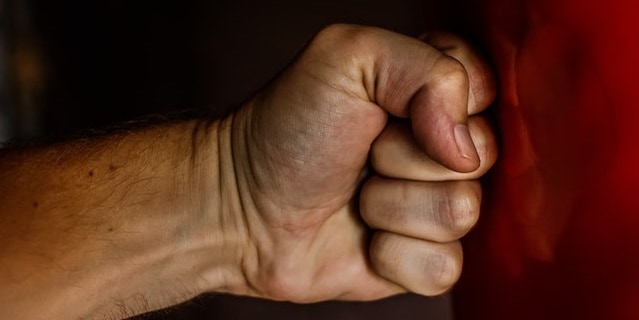
8) Clutter-free homes reduce frustration!
Having fewer possessions to manage means more emotional energy left over. I could show empathy to my children when they hurt themselves or spilled/broke something!
My emotions didn’t automatically jump to anxiety and frustration because of the extra work broken dishes or bleeding sores caused me.
I could keep calm because I wasn’t in a constant state of overwhelm!
My husband and I are less frustrated with eachother now that we minimized our possessions.
We don’t need to feel frustrated about who should be managing what stuff!
When you’re already overwhelmed by the clutter in your home a misplaced sock can seem like a huge issue!
Letting go of things helps put life into perspective!

9) Much of my anxiety over my Special Needs Kids was Alleviated by Decluttering.
Decluttering can never alleviate all anxiety parents to disabled or special need kids feel, but decluttering greatly reduced the anxiety I felt over my kids!
My ADHD children did better in a minimalist environment.
When we decluttered it not only reduced my anxiety, but it alleviated much of my kids’ anxiety as well.
Some of my children’s’ problems with anxiety stemmed from the fact that I needed help from them if I was going to have a chance of keeping the house clean!
This lead to expecting too much of them too soon!
Often I asked my kids to do things like sort 4 different toys and put them away or clean their rooms. These were tasks which they weren’t developmentally ready for because their ADHD and dyslexia meant they were at least a year behind other kids.
My daughter was so overwhelmed by the idea of cleaning her room by herself that if I insisted she burst into tears!
Don’t get me wrong I think kids should clean their rooms, but how we go about it makes a major difference! Read about how I helped my daughter clean her room and keep it that way!! (With little help from me) in my post Help ADHD (ADD) kids clean their rooms and stay organized.
After we decluttered it was much easier for my kids to keep some order in their rooms! We were no longer dealing with a total toy catastrophe in the main living spaces because I only brought in one kind of toy at a time.
When things were at their worst at home I was dealing with many extreme ADHD behaviors. For example, my son would talk about hurting himself and run off when he was frustrated with me or if he felt he could not do what was asked of him (homework, clean his room, etc).
I was forced to leave my 1-year-old in the care of my 5-year-old while I ran around the forest behind our house looking for him. I was afraid he would hurt himself!
As I slowly decluttered our house a little at a time I noticed that his anxiety gradually decreased. His visual cortex was no longer continually on overload! Decluttering did not alleviate all of his problems, but it was extremely helpful!

10) Feeling free to be yourself reduces anxiety!
Giving up trying to keep up with the Joneses is freeing in more than one way.
When I no longer feel the need to have what everyone else has (despite the fact that it may not speak to my personal tastes) I am free to make my own choices and be myself!
There is nothing more stressful than trying to keep up a facade!
I know a girl who decided to give herself a fake identity when she moved to a new city. She lied to her colleagues about everything!
She admitted to me that it was exhausting trying to keep this up! She couldn’t remember which lie she told to whom and when she slipped up and said the wrong thing her coworkers gave her sideways glances.
Needless to say, she didn’t fit in well at her new job and she chose to leave after the summer!
Celebrate that you can be you!

11) Minimalism increases energy!
I find that I have more energy left over for things I want to do when I am not spending all my energy on managing things!
Since I decluttered I work out much more frequently, I get up early to take time for me when my family is asleep, I cook from scratch more often, consequently, we eat healthier meals, and I am less stressed and anxious!
Annie
I even get energy from enjoying my clean clutter-free home. I spend time painting and wallpapering instead of moving around stuff!
Redecorating helps me enjoy my home even more!
All of this gives me extra energy!

12) Decluttering Reduces Decision Fatigue!
When surrounded by clutter the brain’s sensory responses “dampen,” or become weaker, this can lead to decision fatigue!
If you’re like me, when you have too many items in your space you get distracted while cleaning!
Decision fatigue can look like this;
- You go to clean the living room you find things that need to be put away in other parts of the house.
- When you head down to the bathroom with your daughter’s dirty socks you realize that the laundry needs to be hung!
- Instead of finishing the living room, you begin to hang the laundry!
- When you finish you are distracted by the toys your daughter left on the floor.
- You start putting these away instead of finishing the original project which was the Livingroom!
When you have too many items all vying for your attention at once your brain can’t decide what is most important or stay on task!
There is simply too much distraction in the visual cortex which makes it difficult for the brain to sort through all the stimuli and decide what is important!

13) decluttering reduces overstimulation, sensory overload, anxiety, and depression.
We can all be overstimulated, but kids like mine who have ADHD are more suseptable to overstimulation than the rest of us.
I needed to declutter my home because my kids seemed to be constantly overstimulated. They get physically hyper when their senses are overloaded.
I often feel overstimulated, but it’s inner stress. Often I am anxious about something or feel that I have too many things on my plate.
When I pick up the house I often feel that my mental clutter clears as well. It’s easier for me to remember what is most important in a clean decluttered home and if I need to write myself a reminder I can actually see it on my clean dresser or kitchen counter.
Wlaine Aaron a social psychologist wrote an article on overstimulation, ‘’Highly Sensitive People and Depression.’’ She found that 15-20% of people are extra susceptible to overstimulation.
She called these people ‘’Highly Sensitive’’ She wrote that those who have chronic environmental experiences are more susceptible to higher levels of anxiety and depression. (hoarding or living in foster care can be a couple of these experiences)
This is not limited to physical stimuli alone, but elevated levels of depression and anxiety can be brought on by internal overstimulation as well.
Most of us will clearly benefit from decluttering our homes. I encourage you to give it a try. You can box up items and take them to your storage room if you want to test minimalism before you get rid of things.
You can try my spiral method of decluttering. It’s a way to declutter when you’re already overwhelmed and stressed, or if you can’t do it all in one go like the KonMarie method suggests.
You can read about the spiral method here How to Start Living Minimally With an ADHD Family This post is helpful for all families at the beginning of their decluttering journey!
14) Minimalism reduces cortisol levels
Those who live in decluttered environments worry less, stress less, and are less anxious! Annie
women tend to be more affected by clutter than men. Women who feel that their home is cluttered or needs lots of work tend to have higher cortisol levels than normal throughout their day.
Cortisol often called the ‘’Stress Hormone’’ can wreak havoc on our bodies when individuals live with raised cortisol levels for long periods of time. Unhealthy cortisol levels are linked to various diseases, unhealthy mental states, and other conditions.
Dr. Darby Saxbe found that when couples lived in a cluttered home the partner who spent the most time at home tended to be most stressed by the clutter. Often women were at home part-time and would naturally need to spend part of their day moving excess items around in order to accomplish tasks!
That alone would be extremely time consuming and frustrating!
Decluttering can have many positive effects. Jennifer Guttman Psy.D noted that her clients had reduced depression and anxiety levels when they decluttered their homes and their minds!
(Source) 2010 study in The Journal of Personality and Social Psychology
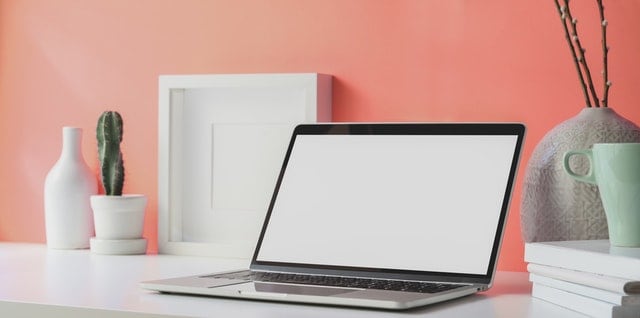
15 Minimalism reduces guilt
I know I feel less guilty when my family can enjoy a clean clutter-free home!
I feel less guilty because:
- I know my kids are in an environment that is good for them.
- I don’t forget important things as easily in a minimalist home.
- I don’t feel guilty about overconsuming and ruining the environment.
- I don’t feel guilty about items that I purchased and now regret buying!
We all buy items from time to time that we wish we hadn’t wasted money on!
When we feel guilty about purchases we can’t take back, often we try to keep the items because that seems to be the only way to make a wrong purchase right.
When we think we will use unwanted items ‘Some Day’ we end up living with clutter. The truth is that keeping items that you don’t like or need will only remind you of your bad decisions and make you feel even more guilty!
The problem is compounded by the fact that clutter keeps us from feeling and functioning at our best! Keeping these mistake purchases around is not healthy!
I still have this problem when I shop for clothes! Eventhough I became very picky about what clothes I buy after I decluttered my wardrobe I still make mistakes.
Some of my clothing purchases that were complete flops were not even my fault! Several times I bought tops looked great in the store only to have them shrink in the wash! I didn’t even put them in the dryer and they shrunk several inches! Of course they didn’t fit properly after that!
I recently found a pair of jeans that I liked and I wanted to purchase 2 pairs. I tried on one then took another identical pair from the rack and bought both!
After taking the tags off and washing them I realized that the pair that I neglected to try on were sewn incorrectly and the flap over the zipper stuck out excessively! If I would have tried on both pairs I would have noticed this!
Another recent jeans catastrophe was caused by the fact that when I am in motion the jeans I purchased tend to start gravitating towards the floor.
When I have the urge to pull my jeans up all day it’s incredibly annoying, and it makes me feel that I don’t look good in my clothes!
If I would have walked around the store after trying the jeans on I may have discovered this before I purchased them!
Holding on to these unfortunate purchases will not make the clothes fit or give me my money back!
I saved the falling down jeans for some months and every time I put them on I regretted wearing them. By the time they got washed and ended up in my wardrobe again, I forgot that they annoyed me to put them back on!
Finally, I had to save myself the headache and just got rid of those horrible jeans!
I feel better when I don’t have unwanted clothes cluttering up my wardrobe. I can find what I want to wear easier, and I know that I look and feel great in all my clothes!
I feel less guilty about bad buys when I get rid of them and don’t have to look at them every day!
Lets learn from our mistakes and move on!

16) You save time when you have an organized minimalist home
Having fewer items to manage saves me time and frusteration. It makes the evenings with my family more fun because I don’t spend the entire evening cleaning!
I do less laundry when we have fewer clothes. Fewer dishes means less stuff to stuff in the dishwasher. Cutting the toys in half decreased the amount of time I spent picking them up.
This made an extraordinary difference in our lives!
Annie
I minimized our cups and mugs last year. My family was getting out new mugs all day! In the evenings 1/2 – 3/4 of the dishwasher full of cups and mugs! I finally got fed up and got rid of all the traditional glass dinner glasses.
I kept some plastic cups for the kids and bought everyone a mug with their name on it!
I kept a few extra mugs for guests and put the rest of the cups, I would need if my husband’s entire family came over, in a cupboard behind large kitchen items.
This was to discourage everyone from getting them out just because they couldn’t find a clean mug!
I encourage my family to use the mug with their name on it all day and put it in the dishwasher in the evening, or wash it by hand if it was an emergency!
My kids do dip into the guest mugs, but this system works far better than I thought. I no longer have to run the dishwasher extra to get all the mugs clean!
Minimalism has saved me time, so I am able to spend time writing for my blog instead of doing excess laundry or washing 25 mugs every evening!

17) You worry less and feel calmer in a minimalist environment
My kids and I feel calmer and worry less in our minimalist home!
I don’t worry about messes because I know that even if the house looks bad the number of items that need to be picked up is minimal!
I feel that my mind is clearer in a minimalist environment.
I can think clearer when I have fewer objects for my brain to register. Instead of worrying that I am forgetting something, I often know what I might forget, and I can write myself a note that I will actually see on my decluttered kitchen counter!
A clearer mind is probably due to the fact that when you brain has fewer items to register your not as likely to experience decision-fatigue or let impulsivity rule the day!
(Source) https://journals.plos.org/plosbiology/article?id=10.1371/journal.pbio.0040056
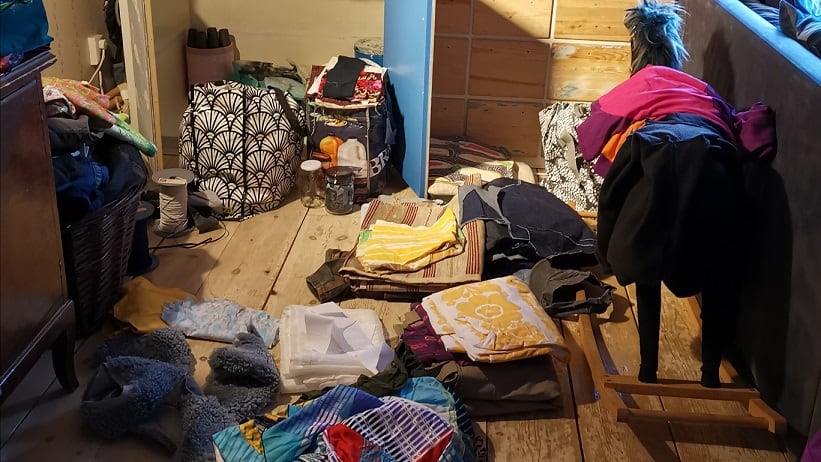
18) cluttered environments spark extra impulsivity!
Those who live in cluttered environments are more impulsive than those who live in clean organized spaces!
A study published 2014 by the University of Chicago titled Impulse Spending? Save Money by Getting Organized found that people were more impulsive in cluttered rooms vs uncluttered rooms.
In the study people were placed in different rooms. Some rooms were cluttered and some were neat and organized. The perticipents were then asked the same questions or asked to perform the same task in both rooms.
In the cluttered rooms, it was harder for participants to control impulses. They were more like to impulse buy items they didn’t need in a cluttered environment.
When placed in cluttered rooms participants performed tasks poorly. this may be due to the findings of another study published in Science Daily
Focusing Attention Cancels Brain-Dampening Effects Of Visual Clutter
They found when individuals were asked to perform tasks in a cluttered room their brain’s mechanism for coping with the clutter was turned off by the effort to concentrate on a task.
It’s interesting that they used different sized rooms in the experiment. They noted that people could perform tasks well in clean organized rooms despite their size (some were small cramped rooms), and they performed tasks poorly in small cluttered rooms and large cluttered rooms alike!
It seems that a tiny well-organized home is better for your mental health than a cluttered mansion!
This is bad news for anyone with ADHD! those of us with ADHD are already incredibly impulsive!
(Source) https://www.sciencedaily.com/releases/1998/10/981005073941.htm
(Source) http://www.jcr-admin.org/files/pressreleases/021114073838_ZhuRelease.pdf
(Source) https://link.springer.com/article/10.1007/s12144-017-9679-4
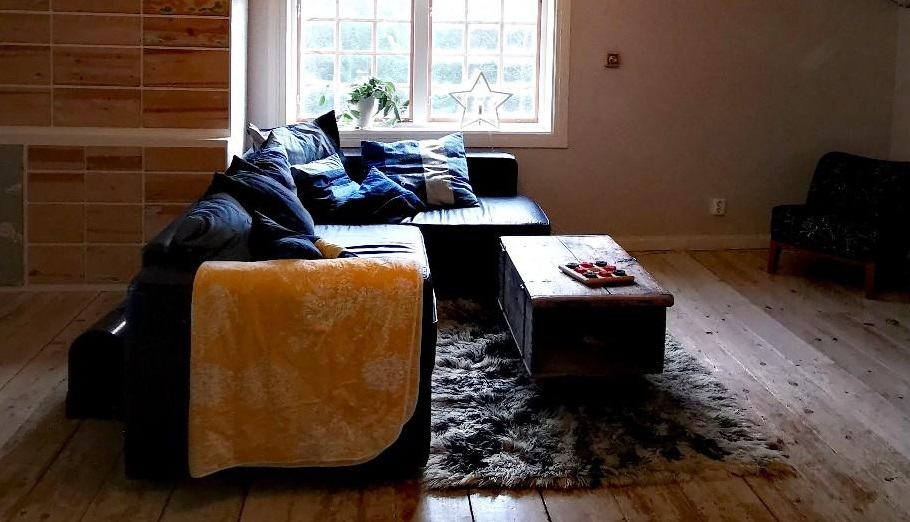
19) Less Clutter = Less procrastination
A study published september 18, 2017 Delaying Disposing: Examining the Relationship between Procrastination and Clutter across Generations published in Current Psychology found a link between procrastination and clutter. This link was present in all age groups!
”Findings suggest that general procrastination tendencies may enable a lifelong pattern of responses to one’s environment that become increasingly maladaptive throughout the life cycle – simultaneously delaying disposal decisions.”
Joseph R. Ferrari and Catherine A. Roster
When participants in the study put off decluttering for long periods of time feelings of dissatisfaction with their life increased!
Decluttering is not always fun. I procrastinated going through our guest house and storage rooms after I finished all the rooms in our house!
This was a mistake because my kids discovered things they originally wanted to get rid of still sitting in the storage room several months later and wanted some of them back!
You can’t just put excess items in the grage or shed because they will creep back into your home!
When you start procrastinating in one area it’s easier to procrastinate in other areas of life.
I find that when I have the house under control (decluttered and clean) my family doesn’t put random stuff on flat surfaces as often, or do a poor job of picking up when I ask them to clean up their mess.
Annie
Our fireplace mantel is a flat surface that my family often dumps keys, old batteries, gloves that need drying, and other winter paraphernalia! This makes the whole area around the fireplace look junky.
I got fed up with this a few months ago.
Completely cleaning off the mantel and giving it a facelift with some new paint, and accessorizing it with a big picture and a vase of orchids made a world of difference.

My family rarely dumps small items on the mantel anymore. No one wants to be the first person to mess up something that is perfectly clean and aesthetically pleasing.
Annie
On the other hand, after the first few items settle on a clean flat surface it seems to be a free-for-all for everyone to dump their loose change in the same spot!
I make sure that the mantel stays clean, by promptly removing items if someone happens to place things there.
This doesn’t happen very often, but when it does happen I am quick to remove things, and my mantel has stayed clean for months!
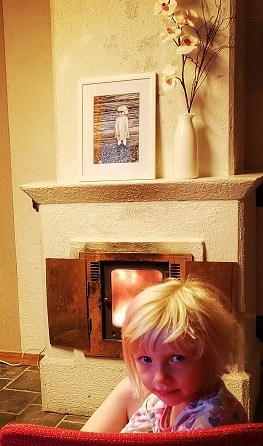
Conclusion
I hope you feel inspired to declutter your space and reduce your anxiety!
If you need help getting started check out my post on my Spiral Method of decluttering.
The Spiral Method is designed for those who are overwhelmed by the idea of decluttering or who are extremely busy.
You can do a little every day and still reach your goals and declutter your home! read my article
How to Start Living Minimally With an ADHD Family
This post explains my Spiral Method and can be incredibly helpful for all of you who don’t know where to start. Even if you don’t have kids with ADHD!
If you need help decluttering and organizing your child’s room I wrote several posts on how to help your child declutter and organize.
The goal of decluttering and reorganizing your child’s room is to help your child do most of their every day picking up and cleaning without your help!
This post Help ADHD (ADD) kids clean their rooms and stay organized can help all kids clean their room and stay organized!
If you have ADHD kids you may need to help a little by having your child report back to you after each task is done.
Then you give them a new task. Kids with ADHD can’t remember five different tasks at once. I usually give out tasks from the kitchen while making dinner, and I always inspect the room before it’s declared done!
Other articles that can help you on your minimizing journey!
What To Do If Your ADHD child Is A Pack Rat!
Don’t make the same 10 minimizing mistakes I did!
Decluttering kids toys and other monsters in their rooms.
A Monochrome bedroom decreased my daughters stress and ADHD
How Minimalism can Reduce ADHD Symptoms

